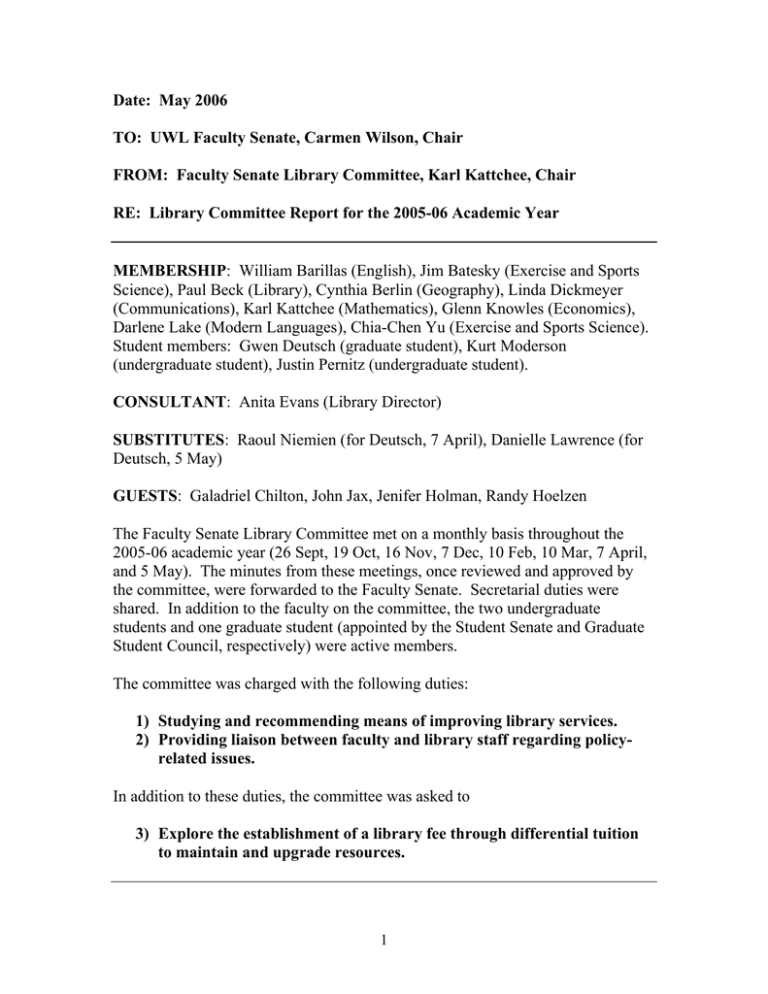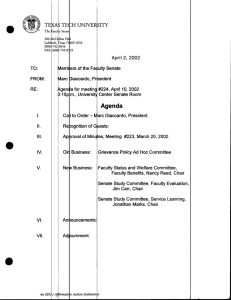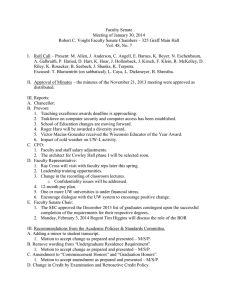Date: May 2006
advertisement

Date: May 2006 TO: UWL Faculty Senate, Carmen Wilson, Chair FROM: Faculty Senate Library Committee, Karl Kattchee, Chair RE: Library Committee Report for the 2005-06 Academic Year MEMBERSHIP: William Barillas (English), Jim Batesky (Exercise and Sports Science), Paul Beck (Library), Cynthia Berlin (Geography), Linda Dickmeyer (Communications), Karl Kattchee (Mathematics), Glenn Knowles (Economics), Darlene Lake (Modern Languages), Chia-Chen Yu (Exercise and Sports Science). Student members: Gwen Deutsch (graduate student), Kurt Moderson (undergraduate student), Justin Pernitz (undergraduate student). CONSULTANT: Anita Evans (Library Director) SUBSTITUTES: Raoul Niemien (for Deutsch, 7 April), Danielle Lawrence (for Deutsch, 5 May) GUESTS: Galadriel Chilton, John Jax, Jenifer Holman, Randy Hoelzen The Faculty Senate Library Committee met on a monthly basis throughout the 2005-06 academic year (26 Sept, 19 Oct, 16 Nov, 7 Dec, 10 Feb, 10 Mar, 7 April, and 5 May). The minutes from these meetings, once reviewed and approved by the committee, were forwarded to the Faculty Senate. Secretarial duties were shared. In addition to the faculty on the committee, the two undergraduate students and one graduate student (appointed by the Student Senate and Graduate Student Council, respectively) were active members. The committee was charged with the following duties: 1) Studying and recommending means of improving library services. 2) Providing liaison between faculty and library staff regarding policyrelated issues. In addition to these duties, the committee was asked to 3) Explore the establishment of a library fee through differential tuition to maintain and upgrade resources. 1 The third charge arose from the 2004-05 Report and comprised a substantial proportion of committee work in 2005-06. A memo has been drafted and forwarded to Faculty Senate which summarizes our findings (a copy is attached). The committee recommends that the library pursue a share of the existing differential funds by lobbying for a “reallocation.” The quest for supplementary funding is indicative of the financial obstacles which are confronting the library. The budget has been flat (since FY01), and the library department has sustained some personnel setbacks, including the loss of the position once held by the head of cataloguing. Expenses related to serial publications are increasing at a rapid pace, and the library continues to cancel periodicals in order to offset this. At the March committee meeting, John Jax, along with Jen Holman and Randy Hoelzen, reported on this situation. A systemwide effort to reduce unnecessary copy duplication continues, according to Jax. It is difficult to figure out exactly how to do this, obviously, and the matter is complicated by the data which shows that new additions to the collection at Murphy Library are checked out quite frequently. The sting of journal cancellations is mitigated by an efficient Interlibrary Loan system and electronic access, where affordable. Relying on vendors to provide electronic access to journal articles can be problematic, too. Costs can change suddenly, and copyright charges will grow as more patrons use the services. The committee recommends that the library continue to pursue sensible cost-cutting measures, but warns that the current situation should not become the norm, particularly in view of our university’s declared intentions to increase enrollment. Additional university resources for library collections and access must be allocated as enrollments increase. As long as reductions in periodicals is a reality, the committee feels that there should be a review of the criteria for determining which journals ought to be eliminated. It is recommended that next year’s committee pursue this. On a related note: Publishers of journals often ask authors to relinquish ownership of their work, a situation which Ken Frazier (Library Director, UW-Madison) expanded upon when he visited UW-L in 2004 (“Responding to the Crisis in Scholarly Publication and Communication,” April 2004) and which the committee has wrestled with. If researchers would make a practice of retaining their right to post their work to an institutional server, then they could loosen the stranglehold which publishers have on the academic literature. The committee suggests that UW-L consider establishing such a server. Murphy Library is in the ongoing process of implementing and managing CrossSearch, a web-based platform where patrons can access all library 2 databases, as well as the catalogs of area libraries. Galadriel Chilton reported on the progress of this project at the October meeting. The interface is constantly improving, but there are incompatibilities with some databases, and the user sometimes needs to go to the “native” interface in order to utilize all of its features. An attractive customizable feature of CrossSearch is the “Quickset”, which allows users to group resources together for the convenience of their classes or for themselves. The committee gave feedback and suggestions and was invited to test some of the features. The committee continues to follow the development of this resource with interest. The appearance of Murphy Library’s first floor will undergo major changes in the coming year. Most of the bound periodicals will be moved to the lower level to make way for an open “collaborative learning information commons.” There will also be additional laptop computers (for checkout), printers, scanners, ethernet jacks, and more. The project will be funded primarily by UW-L Lab Modernization grant dollars. The committee (especially the Chair) is very hopeful that a coffee shop in the extended study area on the first floor will soon become a reality. Around campus, there is a lot of interest in getting the coffee shop done. The committee discussed the coffee shop concept at length, considered how it could enrich the library atmosphere, and provided ideas on how the facility could serve the campus community. The Chair and Library Director monitored the progress of this project by meeting and keeping in touch with some of the key players, including R. Lostetter, M. Lewis, and L. Ringgenberg. There are indications that construction may occur this summer. Representatives of Caribou Coffee visited campus in April (their presentation was attended by Evans, Beck, Moderson, and Kattchee), and Seattle’s Best is scheduled to visit in May. These changes, once they occur, will constitute a definite improvement in library services. They will show that the library is evolving to serve today’s students, who are doing more group work than in the past, who demand convenient internet connectivity all the time, and who want to stay awake. Murphy Library was subjected to the NCA Program Review on 24-25 April. The committee Chair attended a general session with the reviewer. The results of the review are forthcoming. 3 ATTACHMENTS • Memo to Faculty Senate regarding Library Fee. • Notes on CrossSearch ---Galadriel Chilton • “One System One Library” from UW Libraries Strategic Directions for 2005-07 4 Memorandum To: Faculty Senate. Carmen Wilson, Chair From: Library Committee. Karl Kattchee, Chair Date: 5/19/2006 Re: Library Fee The Faculty Senate Library Committee has investigated the possibility of pursuing a student “library fee” to help offset some of the financial strain induced by skyrocketing expenses and flat budgets. To do this was one of the committee charges for this academic year. Several avenues were researched, and brief summaries of our findings are below. We conclude that the best chance of acquiring funding is to tap into the existing differential tuition funds. We investigated the possibility of adding a library fee to the palette of student segregated fees. However, it is thought that such a fee is not in accordance with the standards for segregated fees (see http://www.uwsa.edu/fadmin/gapp/gapp15.htm). Some of the segregated fees collected from the students are designated as “allocable funds”, and the Student Senate Apportionment Committee hears requests for those funds each February. However, those funds must be apportioned in accordance with the existing fee categories. The library’s needs do not fit any of the categories. Our information comes, in part, from conversations with L. Ringgenberg (Director of Student Activities) and from the aforementioned website (to which Ringgenberg directed us). We also considered a new category within the differential tuition (a.k.a. Academic Initiatives) framework which would be dedicated to funding the library. This could be attempted, but the process would be quite lengthy---about three years from the Student Senate floor to the Board of Regents--until it is finalized (Hill Library at UW-Superior acquired some funding in this way). Also, there is the possibility that existing differential funds could be reallocated for library use by arguing that the library qualifies for a share. The Oversight Committee for Academic Initiatives, at its November meeting, recommends allocations for the following year. Our information, to a great extent, came from a meeting with R. Lostetter (Vice Chancellor for Administration and Finance) and S. Radtke (Business Services). The committee concludes that the latter path may be promising. The point has been made that any appeal for funds must have substantial student support in order to succeed. There is currently much pressure on students to accept additional fees, and the issue is becoming a sensitive topic. The Library Committee also agrees that “something is better than nothing,” and that the best course of action for the library is to pursue the reallocation of some differential tuition funds for library use. If this is to happen in FY 2006-7, then this Fall (2006) would be the time to lobby the Oversight Committee in the hope of acquiring funds for FY 2007-08. 1

